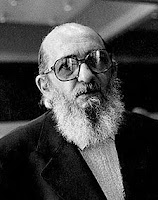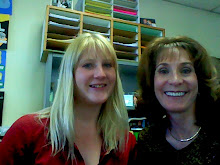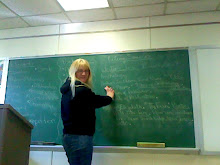Thursday, April 29, 2010
Deep Discussion
Yesterday I attempted something new: deep, menaingful converstaion about real-world issues. I know, I know, sounds too much for sixteen-year-olds to handle, but it worked well! It was time to talk about racial inequality (since I chickened-out and never had a discussion with them about the use of the n-word in the book). I gave them horrifying statistics: 44% of all US prisoners are black, while only 12% of the US population is black. I had to explain what a census was, which I didn't expect. First period was much quieter than third. I imagine they are still sleeeping. Third period had a great discussion that quickly turned to the legalization of marijuana, which I had expected. Fifth period was upset with me for not having statistics for Latinos and Mexican Americans.
Spring is in the air
I forgot to mention that before I left on vacation my kids convinced me to teach class outside for a day. We were just reading the book, so it was simple. It was a beautiful day out and I did not blam my kids for wanting to be outside in the spring. I was substituting for my CT, or else I would have never done it. One girl suggested it and then the rest of the class ganged up on me. They were well-behaved. I read the chapters to them instead of us listening to it on tape. It made me really glad that I did not have to read to the kids every day, my throat would be so hoarse! One boy asked me to read in a Southern accent and I couldn't, so I suggested he read instead. He made it about two pages with his little girl Southern accent before he gave up and let me finish reading. The novelty of being outside really inticed the kids. I think I will teach outside often! I remember the few times when my high school teachers took us outside as a special treat. Good idea, class!
Monday, April 26, 2010
Plan to Grade

I am buried in papers! I am realizing how incredibly intellegent my CT is. For the last book her classes are reading, she assigned literature groups. Each group is responsible for teaching a section of the book to the rest of the class. She grades one group a week and does not have to worry about taking home projects or getting behind in her grading. This is such a wonderful way to assign projects! I will have to think about this more as I plan future units.
A-ha!
Today I was lucky enough to witness an "A-ha!" moment on a student's face. She figured out that it was Boo Radley that saved Jem and Scout from mean old Bob Ewell at the end of To Kill a Mockingbird. I asked her a question about the story and she thought for a minute, and then the realization washed over her face. Her eyes got big and she started squirming in her seat. It was so amazing! It is moments like this that make me realize I really am making a difference in students' lives.
After reading the predictions and repsponses from the students, I realized how beautifully hopeful they are. So many of these kids, even though they are 16 or so, still believe that good will overcome evil, that humans are essentially kind and that the world is a beautiful place. It makes me so happy to have these kids in my life on a daily basis. I feel blessed.
After reading the predictions and repsponses from the students, I realized how beautifully hopeful they are. So many of these kids, even though they are 16 or so, still believe that good will overcome evil, that humans are essentially kind and that the world is a beautiful place. It makes me so happy to have these kids in my life on a daily basis. I feel blessed.
Friday, April 23, 2010
Closing In
Back from a week of fun and sun in California. I know people don't believe me, but I really missed my kids! I was saddened by not being able to travel with them through the exciting climax of To Kill a Mockingbird. We only have a few chapters left in the novel and I am glad we have another month to proccess it all before school is out. The pace of the class feels much more managable without trying to stuff another book into the last six weeks, which started last week. It seems like the year is over already!
Thursday, April 8, 2010
Do and Don't List of Parent/Teacher Conferences
After a week of student-led parent/teacher conferences, I have created my own survival list:
DO:
Remain humble. You may be an expert at school, but parents remain the expert of their children
Listen more than you talk. You talk all the time during class, let someone else share how they feel.
Stay positive. Focus on the future and stress that you’re main goal is the success of the student.
Create an atmosphere of openness. You have the home advantage; you’re on your turf. To make up for that, you must be extra welcoming and understanding.
Come prepared with students’ grades, examples of work, issues you have observed and (most important) suggestions for solutions.
DON’T:
Judge families or assume things about families. You only spent about an hour with them, you do not know them.
Ever talk bad about other teachers, parents or students in front of families.
Focus on negative aspects about the past. Even if this student gave you hell last semester, this is water under the bridge and it is time to move forward.
Waste parents’ time with explaining things that are unimportant or irrelevant. If the student does not have an attendance problem, don’t go over the attendance policy again.
DO:
Remain humble. You may be an expert at school, but parents remain the expert of their children
Listen more than you talk. You talk all the time during class, let someone else share how they feel.
Stay positive. Focus on the future and stress that you’re main goal is the success of the student.
Create an atmosphere of openness. You have the home advantage; you’re on your turf. To make up for that, you must be extra welcoming and understanding.
Come prepared with students’ grades, examples of work, issues you have observed and (most important) suggestions for solutions.
DON’T:
Judge families or assume things about families. You only spent about an hour with them, you do not know them.
Ever talk bad about other teachers, parents or students in front of families.
Focus on negative aspects about the past. Even if this student gave you hell last semester, this is water under the bridge and it is time to move forward.
Waste parents’ time with explaining things that are unimportant or irrelevant. If the student does not have an attendance problem, don’t go over the attendance policy again.
Humanization
“I’ve come to the frightening conclusion that I am the decisive element in the classroom. It’s my personal approach that creates the climate; it’s my daily mood that makes the weather. As a teacher, I possess a tremendous power to make a child’s life miserable or joyous. I can be a tool of torture, or an instrument of inspiration. I can humiliate or humor, hurt or heal. In all situations it is my response that decides whether a crisis will be escalated or de-escalated or a child humanized or dehumanized.”
- Haim Ginott
- Haim Ginott
Pedagogy of What?
 I spent last night in the library, busily researching a paper I'm writing. I just learned about Paulo Freire, the godfather of critical pedagogy. He wrote The Pedagogy of Opression, which plays a large role in service learning education. Apparently, there are three main camps of education: conservative/traditional, progressive/liberal and critical. Dewey, the father of experiential learning, criticizes both traditional and progressive education . Dewey says that education is inseprable from democracy.
I spent last night in the library, busily researching a paper I'm writing. I just learned about Paulo Freire, the godfather of critical pedagogy. He wrote The Pedagogy of Opression, which plays a large role in service learning education. Apparently, there are three main camps of education: conservative/traditional, progressive/liberal and critical. Dewey, the father of experiential learning, criticizes both traditional and progressive education . Dewey says that education is inseprable from democracy.So, when my professor mentioned Dewey in class and received a room full of blank stares, I knew something was wrong. I had only encountered Dewey briefly in my Special Education class, and did not know his story. I feel like the more I learn, the less I know.
How are we going to be good teachers if we are not aware of the great philosphers who shaped our educational policy?
How are we going to defend our teaching methods when we cannot name them correctly, or comprehend them within the greater sphere of education?
I have been teaching on gut instinct. My college courses gave me a toolbox of methods and practices I can use in the classroom. But I have no idea where these come from or on what ideals they are based. I used to cling to the idea of teaching critical thinking. Our future is uncertain and by teaching kids to think critically they can learn to adapt. Now I am so unsure of the purpose of education.

I do not see students as empty vessels to fill, but as young people who need guidance. Literature is a place where they can find some guidenace about how to interact with others and be happy in their own lives.
I feel lucky to have another year of schooling. I think I'll just go for my PhD actually...
Tuesday, April 6, 2010
One Bone at a Time
 From the Web site: "One Million Bones is a fundraising art installation designed to recognize the millions of victims killed or displaced by ongoing genocides occurring on our watch.
From the Web site: "One Million Bones is a fundraising art installation designed to recognize the millions of victims killed or displaced by ongoing genocides occurring on our watch.Our Mission is to increase global awareness of these atrocities while raising the critical funds needed to protect and aid displaced and vulnerable victims.
One Million Bones will represent victims of genocide, creating a visual demand for solutions to this issue. Ignored and therefore permitted, genocide continues today, while widespread awareness of it remains buried. One million people will each create one bone to represent one victim. Installed together, these million bones will flood the National Mall in Washington, D.C., unearthing the memory of these victims while calling citizens to action: mourning yesterday’s casualties, caring for today’s refugees, saving tomorrow’s people."
This is so amazing! I am beginning to create a unit plan for a paper incorporating the book A Long Way Gone: Memiors of a Boy Soldier with this wonderful project: One Million Bones.
The creater of the project even has a video on TED. I will share more as I collect information.

Student-led Conference
I just had my first official student-led parent/teacher conference! It went simmingly. The mother is invloved in her son's life, and that makes all the difference. We discussed all his classes, his strengths and weaknesses, and his goals for next year. Parent involvement is so important to the success of a struggling student. It was nice that I had called her a few weeks ago and we spoke on the phone for a bit about her son. She was comfortable speaking with me about her worries and her son's performance. The student was extremely nervous, which was adorable. I am guessing all conferences will not go as smoothly. It is great to start off on the right foot though!
I thought this was pretty funny, so I stole it from another blogger.
"TIPS TO SURVIVING PARENT/TEACHER CONFERENCES
1. Diet Coke
2. It's best not to laugh at the kids who you get in trouble while their parents are still sitting there.
3. Eat garlic before hand...parents tend not to linger.
4. When talking to parents avoid phrases like, "You look so familiar. Did I see you at the bar last weekend?" or "I'm not sure why your kid is failing. Maybe you should just stick him/her in special ed."
5. If a parent tells you that their child is too smart for your class--agree. Then send them directly to the principal to tell her how smart the kid is and demand that they be transferred out of your class and into honors English. Nobody likes those know-it-all kids anyway.
6. Be extra-nice to the parents whose kids are idiots...after all, they are stuck with them forever. You are only pulling a 45 minute shift a few times a week.
7. Never admit that you really have no recollection of ever seeing their child before.
8. On the day of P/T conferences make your kids feel sorry for you because you have to be there all day, and tell them to bring you stuff when they come with their parents.
9. NEVER eat anything homemade they bring you.
10. Make sure you've planned an easy teaching day for the day after because post parent/teacher conference hangover is a beast."
I thought this was pretty funny, so I stole it from another blogger.
"TIPS TO SURVIVING PARENT/TEACHER CONFERENCES
1. Diet Coke
2. It's best not to laugh at the kids who you get in trouble while their parents are still sitting there.
3. Eat garlic before hand...parents tend not to linger.
4. When talking to parents avoid phrases like, "You look so familiar. Did I see you at the bar last weekend?" or "I'm not sure why your kid is failing. Maybe you should just stick him/her in special ed."
5. If a parent tells you that their child is too smart for your class--agree. Then send them directly to the principal to tell her how smart the kid is and demand that they be transferred out of your class and into honors English. Nobody likes those know-it-all kids anyway.
6. Be extra-nice to the parents whose kids are idiots...after all, they are stuck with them forever. You are only pulling a 45 minute shift a few times a week.
7. Never admit that you really have no recollection of ever seeing their child before.
8. On the day of P/T conferences make your kids feel sorry for you because you have to be there all day, and tell them to bring you stuff when they come with their parents.
9. NEVER eat anything homemade they bring you.
10. Make sure you've planned an easy teaching day for the day after because post parent/teacher conference hangover is a beast."
Monday, April 5, 2010
S-S-S-O-F-M-M-M-O-R, S-O-F-M-O-R Sophomores!
Other than the fact that we're teaching our sophomores to spell incorrectly, the spirit assembly was a blast. Today was my first assembly at AHS. It was a Spring Spirit and Sports Assembly. Which means it is an attempt to recognize student athletes and raise student involvement. About a third of the school was absent, since it is the first day back from a long weekend, and only juniors have to be at school for testing the rest of the week. Everyone else gets a second spring break. The assembly was chaotic and very, very noisy. The juniors won the Spirit Stick for being the loudest and rowdiest. The juniors and seniors rushed the floor and nearly trampled several people. I was glad to be up in the sophomore section, away from all the action. It was nice to see my students recognized for their commitment and acheivements to school activities. Attending the assembly made me remember a lot about my high school years. It was fun to see kids being kids -rowdy, loud, and disorganized.
Subscribe to:
Posts (Atom)




